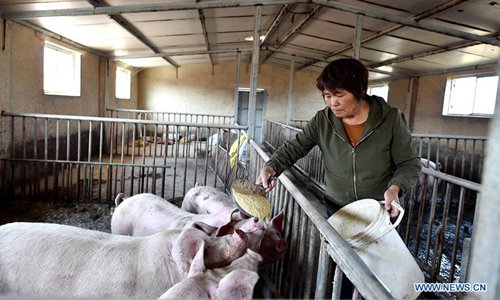HOME >> SOURCE
China does not need to rely on the US to ensure domestic pork supply
By Hu Weijia Source:Global Times Published: 2019/12/10 13:35:47

Xinhua/Zhan Yan
Could US agricultural imports curb inflation in China? Probably not. China's shortage of pigs is a fact, which means the country's pork imports will expand further. But Brazil, instead of the US, is likely to become the biggest beneficiary of China's pork import expansion.The spike of November's consumer inflation was mainly attributed to rising food prices, particularly pork, which is a staple of the Chinese diet. Analysts estimate that holiday-season spending at the end of the year may push the demand for pork up further and pile more pressure on China to import US farm goods. However, those analysts are ignoring a fact: the US is not the only source of China's pork imports. South American and European countries are likely to gain more from China's increasing pork imports.
There is no need to read too deeply into November's consumer inflation reading. Soaring pork prices have gradually slowed in recent weeks. From November 25 to December 1, the wholesale price of pork dropped 3 percent from the previous week, according to the Ministry of Commerce. The current situation is not as severe as it was in the beginning of November.
China has stepped up efforts to stabilize hog production and ensure the country's pork supply. Data from the Ministry of Commerce suggests such measures have begun to take effect. While China is reasonably seeking to boost its pork imports, the country will strive to expand domestic supply to meet pork demand and curb a further increase in pork prices.
The author is a reporter with the Global Times. bizopinion@globaltimes.com.cn
Posted in: COLUMNISTS